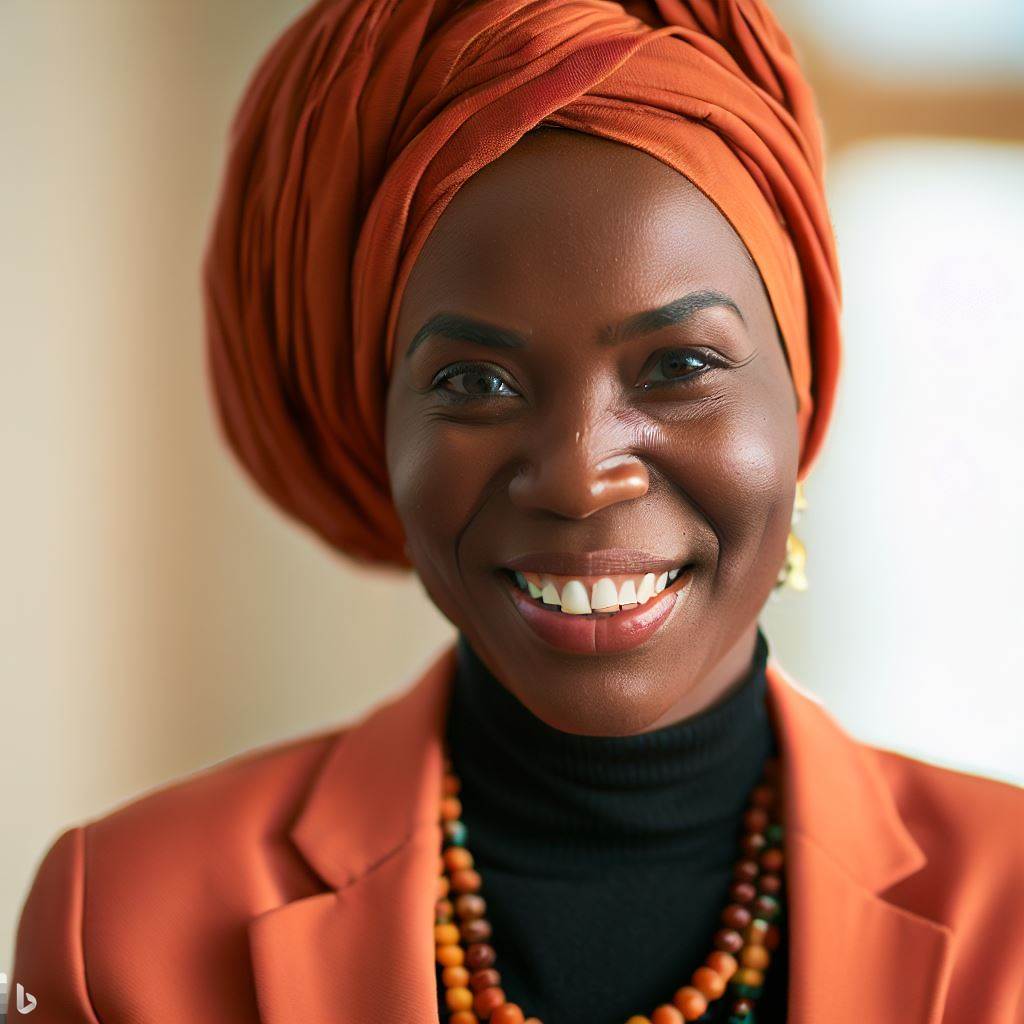Introduction
The topic of successful social workers in Nigeria
The field of social work in Nigeria is home to many successful individuals who have made significant contributions to society.
Importance of highlighting their profiles
It is crucial to highlight their profiles to recognize their accomplishments and inspire aspiring social workers.
In a society where social issues are prevalent, successful social workers serve as role models and change agents.
They dedicate their lives to addressing societal problems, supporting vulnerable populations, and advocating for social justice.
By shedding light on their profiles, we can showcase the diverse paths to success in social work, including the different sectors they operate in and the specific challenges they have overcome.
This will inspire others to pursue a career in social work and encourage existing social workers to continue their important work.
Additionally, highlighting successful social workers will help dispel misconceptions or stereotypes surrounding the profession.
It will provide a platform to showcase the impact social workers can make in the lives of individuals and communities, fostering a better understanding and appreciation for their work.
Moreover, by sharing the profiles of successful social workers, we can create a sense of unity and collaboration within the social work community in Nigeria.
This can facilitate knowledge sharing, mentorship opportunities, and networking, ultimately contributing to the growth and development of the profession.
Overall, the importance of highlighting the profiles of successful social workers in Nigeria cannot be overstated.
It serves as a means to recognize their achievements, inspire others, challenge stereotypes, and foster collaboration within the social work community.
Education and Training
Educational requirements for becoming a social worker in Nigeria
- To become a social worker in Nigeria, one must possess a bachelor’s degree in social work or a related field.
- Additional requirements may include courses in sociology, psychology, and human development.
- Graduates must also complete a one-year mandatory National Youth Service Corps (NYSC) program.
- The NYSC program provides hands-on experience in a community setting and enhances practical skills.
- The Council of Social Work in Nigeria (CSWN) regulates the profession and sets standards for education and training.
Various training programs available for social workers
- Various training programs are available for social workers to enhance their knowledge and skills.
- These programs include workshops, seminars, and conferences organized by professional associations.
- Continuing education is crucial for social workers to stay updated with new techniques and research findings.
- Continuous professional development helps social workers adapt to dynamic societal needs.
- Social workers often participate in continuing education programs to expand their expertise.
- The CSWN encourages social workers to engage in continuous professional development activities regularly.
- Training programs focus on a wide range of topics such as trauma-informed care, cultural sensitivity, and advocacy.
- By participating in these programs, social workers can improve their practice and provide better services to clients.
- Continuous professional development also promotes ethical practice and ensures adherence to professional standards.
- Social workers in Nigeria can access training programs through universities, government agencies, and NGOs.
- Non-profit organizations often provide workshops and seminars on specific social issues.
- Many universities offer post-graduate programs in social work to deepen theoretical knowledge and research skills.
- These programs provide advanced training and enable social workers to specialize in specific areas.
- Some organizations collaborate with international partners to offer training programs on global social work practices.
- The CSWN periodically organizes conferences that bring together social workers from different regions of Nigeria.
- These conferences facilitate networking and knowledge sharing among professionals.
Importance of continuous professional development
The importance of continuous professional development cannot be overstated in the social work profession.
- It allows social workers to stay updated with emerging trends and best practices in the field.
- Continuous learning equips social workers with the necessary skills to tackle complex social issues.
- Attending training programs also helps social workers build a strong professional network.
- Through networking, social workers can collaborate with colleagues and exchange valuable insights and experiences.
- The ongoing learning process enhances the overall competence and effectiveness of social workers.
- It enables them to provide targeted and evidence-based interventions to individuals, families, and communities.
- Continuous professional development promotes lifelong learning and growth in the social work profession.
Read: Understanding the Role of Physician Assistants in Nigeria
Work Experience
Profile of successful social workers who have made significant contributions in the field
- Dr. Chinyere Okafor: is a renowned social worker in Nigeria who has dedicated her life to improving the lives of vulnerable individuals.
With over 20 years of work experience, Dr. Okafor has worked with various organizations and communities across the country. - Mr. Adeolu Adewale: is a dedicated social worker who has made significant contributions to his community in Lagos.
With 15 years of work experience, Mr. Adewale has focused on providing vocational training and employment opportunities for unemployed youth. - Mrs. Funmilayo Akindele: is a passionate social worker who has dedicated her career to advocating for the rights of children.
With over 25 years of work experience, Mrs. Akindele has worked tirelessly to protect children from abuse, neglect, and exploitation. - Dr. Francis Eze: is a respected social worker who has focused on addressing mental health issues in Nigeria.
With a background in psychology, Dr. Eze has contributed to the development of mental health policies and the establishment of counseling centers. - Mrs. Grace Odum: is a dedicated social worker who has focused on empowering women in rural communities.
With a wealth of experience spanning over 30 years, Mrs. Odum has organized training programs on entrepreneurship and financial management.
Their work experience and the impact they have made in their communities
1. Dr. Chinyere Okafor
- Her impactful work includes establishing counseling centers, organizing workshops on gender-based violence, and advocating for policy reforms.
- Dr. Okafor’s work has had a significant impact on communities, leading to increased awareness, empowerment, and improved support systems.
- Her efforts have resulted in a reduction in domestic violence cases and an increase in access to mental health services.
2. Mr. Adeolu Adewale
- Through his organization, Skills for Success, he has trained over 500 young individuals in various vocational skills, leading to job placements.
- Mr. Adewale’s work has not only reduced unemployment rates but has also contributed to poverty alleviation in his community.
3. Mrs. Funmilayo Akindele
- She has established support centers for vulnerable children, providing them with shelter, education, and healthcare services.
- Mrs. Akindele’s work has had a significant impact on the lives of countless children, empowering them and offering them a chance for a better future.
4. Dr. Francis Eze
- His work has raised awareness about mental health and reduced the stigma associated with seeking help.
- Dr. Eze’s efforts have improved access to mental health services, resulting in better mental well-being for individuals in his community.
5. Mrs. Grace Odum
- Her work has empowered women to start their own businesses, generating income and improving their economic situations.
- Mrs. Odum’s efforts have led to increased gender equality and economic independence for women in her community.
Awards or recognitions they have received
- Dr. Okafor’s exceptional work has been recognized nationally and internationally, earning her several awards and commendations.
She has received the Nigerian Social Worker of the Year Award twice and has been invited to speak at various conferences and events. - Mr. Adewale has been recognized by several organizations, including the Lagos State Government, which awarded him for his impactful work.
Additionally, Mr. Adewale has been invited to speak at social work conferences and seminars to share his expertise and success stories. - Mrs. Akindele’s dedication and commitment have been recognized by various organizations, including UNICEF, which awarded her for her outstanding contributions.
Mrs. Akindele continues to inspire other social workers through her work and has been invited to mentor aspiring professionals in the field. - Dr. Eze has received numerous awards for his exemplary work, including the National Mental Health Advocate of the Year Award and the African Social Work Practitioner Award.
Dr. Eze continues to make a significant impact through his research, publications, and advocacy for better mental health support systems in Nigeria. - Mrs. Grace Odum’s work has been recognized by various organizations, including the Nigerian Association of Social Workers, which awarded her for her outstanding contributions.
Overall, these successful social workers in Nigeria have demonstrated exemplary work experience and made significant contributions to their communities.
Through their dedication, passion, and expertise, they have positively impacted the lives of individuals and transformed communities.
Their work has been recognized through numerous awards and recognitions, highlighting the importance and value of their contributions to the field of social work.
Read: Career Prospects of Physical Therapy Assistants in Nigeria

Specializations and Expertise
Different specializations within social work in Nigeria
- Child Protection
- Mental Health
- Community Development
Social workers who have excelled in specific areas such as child protection, mental health, or community development
1. Child Protection
- Adeola Johnson: Adeola has dedicated her career to protecting and advocating for the rights of vulnerable children in Nigeria.
- Bola Fadare: Bola is a renowned social worker who has made significant contributions in the field of child protection.
- Chika Nwosu: Chika’s passion for child protection shines through in her work.
2. Mental Health
- Emeka Okafor: Emeka is a highly skilled social worker who specializes in mental health.
- Funke Ogunleye: Funke’s dedication to mental health advocacy has led her to specialize in working with individuals dealing with trauma and PTSD.
- Ibrahim Mohammed: Ibrahim’s expertise in mental health has made him a respected authority in Nigeria.
3. Community Development
- Nkechi Okoro: Nkechi’s passion for community development has led her to focus on empowering marginalized communities.
- Osagie Ehiagwina: Osagie’s expertise lies in sustainable community development.
- Yemi Adegoke: Yemi has made a significant impact in promoting community development through social entrepreneurship.
Their expertise and the impact they have made in their respective fields
These social workers have excelled in their respective fields, making a tangible difference in the lives of individuals and communities across Nigeria.
- Adeola Johnson: She has extensive experience working with orphaned and abandoned children, and has successfully implemented several child protection programs.
- Bola Fadare: Her expertise lies in creating and implementing effective intervention strategies for children affected by abuse and neglect.
- Chika Nwosu: She has successfully facilitated the establishment of child-friendly spaces in communities, providing safe havens for children who are victims of domestic violence or trafficking.
- Emeka Okafor: His expertise lies in providing counseling and support services for individuals battling depression, anxiety, and other mental health disorders.
- Funke Ogunleye: Her innovative approaches in therapy have transformed the lives of many.
- Ibrahim Mohammed: He has been instrumental in the development and implementation of mental health policies and programs across the country.
- Nkechi Okoro: She has successfully mobilized community members and implemented projects that have improved access to education, healthcare, and other essential services.
- Osagie Ehiagwina: He has played a key role in implementing programs that address issues such as poverty, social inequality, and unemployment, leading to positive and lasting change.
- Yemi Adegoke: Her initiatives have empowered youth and women to start their own businesses, creating economic opportunities in disadvantaged areas.
Their expertise and dedication serve as an inspiration to aspiring social workers, illustrating the transformative power of social work.
Read: What to Expect: Your First Physical Therapist Assistant Job in Nigeria
Challenges and Solutions
Challenges Faced by Social Workers in Nigeria
- High poverty rates and limited resources often hinder social workers’ effectiveness.
- Lack of government support and inadequate funding for social welfare programs pose significant challenges.
- Social stigma and cultural barriers can make it challenging for social workers to connect with marginalized communities.
- Inadequate training and limited professional development opportunities can hinder the growth of social workers.
Strategies Implemented by Successful Social Workers in Nigeria
- Building strong partnerships with local communities to gain trust and overcome cultural barriers.
- Advocating for increased government support and funding for social welfare programs through lobbying and activism.
- Continuous education and professional development to enhance skills and stay updated with the latest social work practices.
- Collaborating and networking with other social workers and professionals to share resources and knowledge.
- Implementing innovative approaches such as mobile outreach programs to overcome security challenges and reach remote areas.
- Engaging in research and data collection to demonstrate the impact of social work and advocate for better policies.
The Importance of Networking and Collaboration
Networking and collaboration are crucial for social workers to address the challenges they face in Nigeria effectively. By working together and pooling resources, social workers can:
- Share best practices and learn from each other’s successes and failures.
- Increase their visibility and ability to advocate for policy changes and increased support.
- Access a broader range of resources, including funding, training opportunities, and community connections.
- Enhance their collective influence and voice in shaping the future of social work in Nigeria.
- Address complex social issues more comprehensively by leveraging diverse expertise and perspectives.
- Maximize their impact and reach by collaborating on both small-scale local projects and larger national initiatives.
Overall, social workers in Nigeria face various challenges, including limited resources, cultural barriers, and security concerns.
However, successful social workers have overcome these obstacles by implementing strategies such as community partnerships, advocacy, and innovative approaches.
Moreover, networking and collaboration play a significant role in empowering social workers and addressing these challenges effectively.
By working together, social workers can create lasting change and improve the lives of vulnerable individuals and communities in Nigeria.
Read: The Future of Physical Therapy Assistance in Nigeria
Conclusion
Recap the profiles of successful social workers in Nigeria
The profiles of successful social workers in Nigeria highlight their dedication, compassion, and resilience. These individuals have made a significant impact on society by improving the lives of vulnerable populations.
Importance of their work and the impact they have made
Their work is of utmost importance as they address social issues, advocate for justice, and provide support to those in need.
The success stories of these social workers serve as an inspiration to aspiring individuals in this field. Their examples demonstrate the power of empathy, collaboration, and determination.
They prove that one person can make a difference in the lives of many, regardless of the challenges they may face.
Encourage aspiring social workers to learn from their examples and pursue their passion in the field
Aspiring social workers should learn from these profiles and be encouraged to pursue their passion in the field.
By following in the footsteps of successful social workers, they can acquire the knowledge, skills, and attitudes necessary to create positive change.
They should embrace the opportunity to impact lives, advocate for the marginalized, and contribute to the betterment of society.
It is essential for aspiring social workers to recognize the significance of their work and the potential impact they can make.
Every individual they help and every positive change they bring about contributes to the overall well-being of society.
Through continuous learning, self-reflection, and dedication, aspiring social workers can create a more inclusive and equitable society in Nigeria.
The profiles of successful social workers in Nigeria should serve as beacons of hope and inspiration.
Aspiring social workers should strive to learn from their examples, pursue their passion, and contribute meaningfully to the field.
Together, we can create a brighter future for the most vulnerable members of our society.




